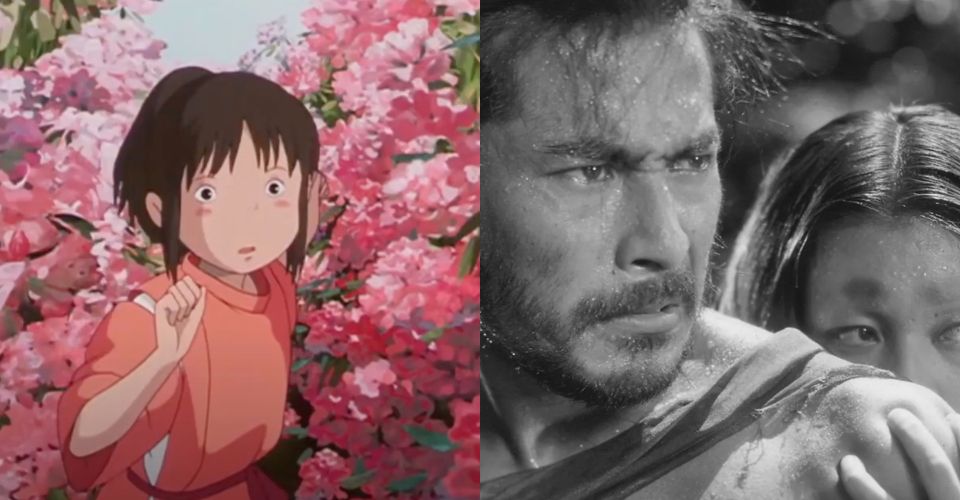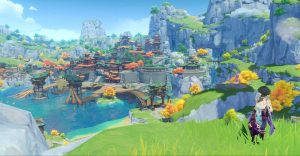10 Japanese Movies Nominated For Oscars

Ryûsuke Hamaguchi’s Drive My Car (2021) has made history by being the first Japanese film nominated for Best Picture at the Academy Awards. The film is also nominated for three other Oscars including Best Achievement in Directing for Hamaguchi, making him only the third Japanese director nominated.
However, many other Japanese movies have performed well at the Academy Awards in the past. Some have won the Oscar for Best International Feature Film, formerly known as the Best Foreign Language Film, being merely an honorary award prior to that. Others have also been recognized in categories such as costume design, production design, and cinematography.
Ugetsu (1953)

Ugetsu is a film that tackles many themes: ambition on the brink of becoming avarice, fantasy attempting to overpower love, and peace shattered by a devastating war. The film follows a potter seeking riches and a wanna-be-samurai who disregard the safety of their wives to pursue their vocational aspirations.
One of Kenji Mizoguchi’s many widely celebrated films, Ugetsu surprisingly did not receive the nomination for Best International Feature Film. It did, however, receive a nomination for Best Costume Design. The costumes and many other aspects of the film are remarkable.
Kwaidan (1964)

Masaki Kobayashi reached the forte of his filmmaking as the golden age of Japanese cinema was ending, but his films truly compete with the greats. The Human Condition (1959-61) and Hara-Kiri (1962) are epic, harrowing movies that demand respect.
Kwaidan, while of a more contained scale than Kobayashi’s films from a few years prior, is a thrilling collection of four supernatural horror stories. As horror films are rarely given much attention at the Academy Awards, it is surprising that of all Kobayashi’s films, Kwaidan is the one that was nominated for Best International Feature Film.
Shoplifters (2018)

Shoplifters follows an impoverished family that resorts to theft to make it by. One night, they bring a neglected child home with them to feed her dinner. They decide to keep her and raise her as one of her own.
The film is by Hirokazu Koreeda, who is widely thought of as one of the greatest modern Japanese filmmakers. His other films include Nobody Knows (2004), Still Walking (2008), and Like Father, Like Son (2013). Shoplifters is, to date, his only film nominated for Best International Feature Film and the first time a Japanese film had been nominated in a decade.
Samurai I: Musashi Miyamoto (1954)

Filmmaker Hiroshi Inagaki made a trilogy focused on the legendary and historical samurai, Musashi Miyamoto. Each film of the trilogy is well-regarded. One of Jane Campion’s favorite movies, Samurai I: Musashi Miyamoto is the first installment of the trilogy and won Best International Feature Film at the 1955 Academy Awards.
The film follows Takezo, portrayed by Japanese film icon Toshiro Mifune, as he unexpectedly finds himself on the losing side of a regime-changing battle. He and his companion flee from the pursuit of warriors from the victorious side. During the film, viewers see the outlawed warrior evade many dangers, eventually being granted the title of samurai and given the new name, Musashi Miyamoto.
Gate Of Hell (1953)

The 1950s is widely considered to be the golden age of Japanese cinema and it is no surprise that three Japanese films were honored at the Academy Awards during this decade, including Gate of Hell. The film is also the only Japanese film to win more than one Oscar, having won both Best International Feature Film and Best Costume Design.
Gate of Hell is about a samurai who falls for a lady-in-waiting. He asks for her hand in marriage only to discover that she is already married. He will not take no for an answer though and coerces her into agreeing. The samurai concocts a plan to murder her husband, but the lady-in-waiting has a plan of her own.
Departures (2008)

Departures’ win of “Best Foreign Language Film of the Year” at the 2009 Academy Awards was significant because a Japanese film had not won the award or any of its prior equivalents since 1955. If Drive My Car takes the award this year, it will replace Departures as the most recent winner from Japan.
In Departures, a cellist becomes unemployed and returns to his hometown with his wife. As he looks for work, he pursues what he thinks is a job at a travel agency because the description is “assisting departures.” However, he discovers that it is actually a job preparing the dead for cremation and he is lured to stay because of how much it pays. He is embarrassed by how he is making money and hides it from his wife, but he will not be able to hide it forever.
Spirited Away (2001)

Regarded as one of the greatest animated films of all time, Spirited Away follows a 10-year-old girl named Chihiro as she stumbles into the fantastical and dangerous spirit world of the kami. Hayao Miyazaki of Studio Ghibli won the Academy Award for Best Animated Feature Film. If the film were released more recently, it probably would have received other nominations, as well.
The film, in many ways, is an exploration of Western influences on Japanese culture. Chihiro encounters kami, spirits from Japanese folklore, when she moves with her parents away from the city and into the suburbs. Spirited Away also has clever allusions to capitalism, consumerism, and pollution. The film is easily enjoyed as a series of metaphors or simply as an entertaining children’s story.
Rashomon (1950)

Before Rashomon was released, its filmmaker Akira Kurosawa was expecting to have to give up filmmaking because of recent career setbacks. But since Kurosawa is easily one of the most influential filmmakers of all time, inspiring directors like Sergio Leone, Francis Ford Coppola, Martin Scorsese, Steven Spielberg, and countless others, cinema would be far less interesting had he retired. Not only did the film perform well in Japan, but it would win the Golden Lion at the Venice Film Festival in 1951, putting Japanese cinema on the map for international audiences and critics.
This success would carry on into 1952 when it became the first Japanese film to receive the Oscar for Best International Feature Film. Rashomon is about a group of individuals on trial for the murder of a samurai. Each gives contradictory accounts of the events, the first time in film that the storytelling device of the unreliable narrator is fully utilized. The film also ponders the depravity of man, as a woodcutter and a priest relay the events of the trial to an irreverent man who takes shelter from the rain with them.
Woman In The Dunes (1964)

Woman in the Dunes is inarguably the finest work of Japanese avant-garde filmmaker, Hiroshi Teshigahara. Despite his disregard of all filmmaking conventions, Teshigahara became the first person from Japan to receive an Academy Award nomination for directing, although many Japanese films had received other nominations prior.
Adapted from a novel, which, in parts, resembles the Greek myth of Sisyphus, Woman in the Dunes is about an entomologist who goes on a rural expedition to collect insects residing in the sand dunes. He becomes stranded and nearby villagers offer him lodging in a house at the bottom of a sandpit, which he accepts. A young woman lives in the house and although he only intends to stay one night, the villagers have a different scenario in mind.
Ran (1985)

Having the honor of being the Japanese film with the most Oscar nominations until being tied by Drive My Car, Ran also won two BAFTAs and was nominated for an additional four. Significantly, Kurosawa received his only Oscar nomination for directing this film.
Ran is about a warlord who abdicates his throne and splits his kingdom up between his sons, resulting in betrayal and war. Heavily inspired by Shakespeare’s King Lear, it was the third time Kurosawa borrowed from the playwright. While most would consider either Rashomon (1950) or Seven Samurai (1954) his best work, Ran is certainly the filmmaker’s most epic and largescale production.
About The Author

















